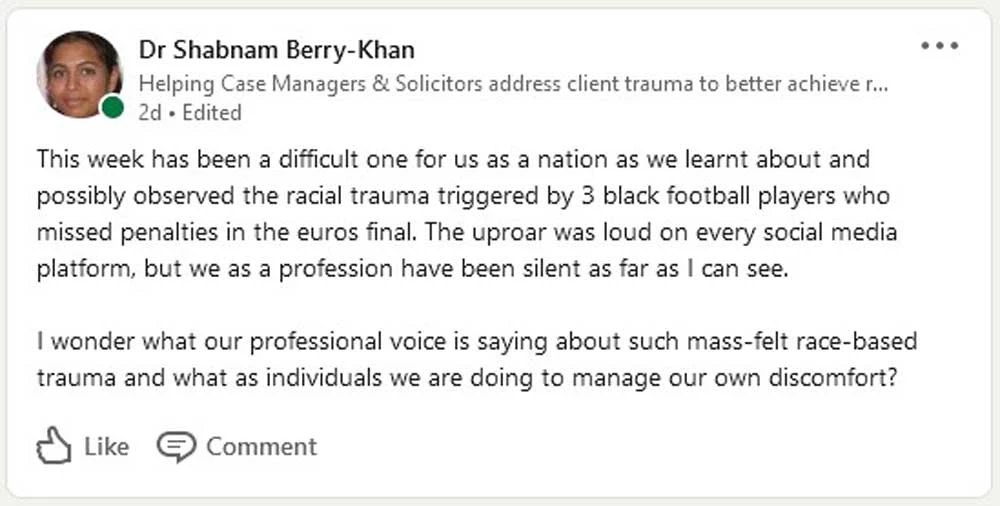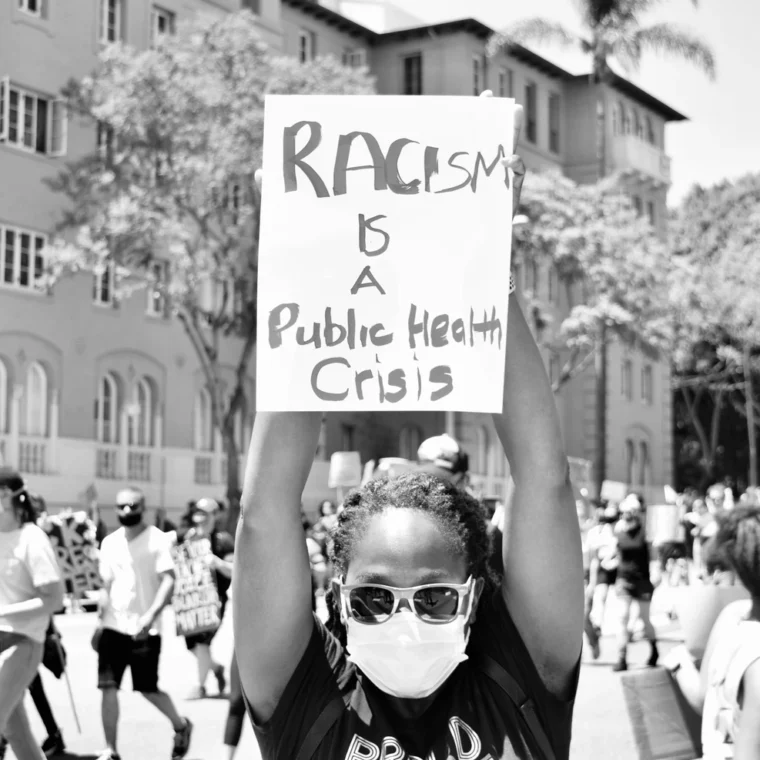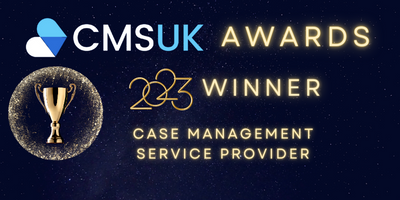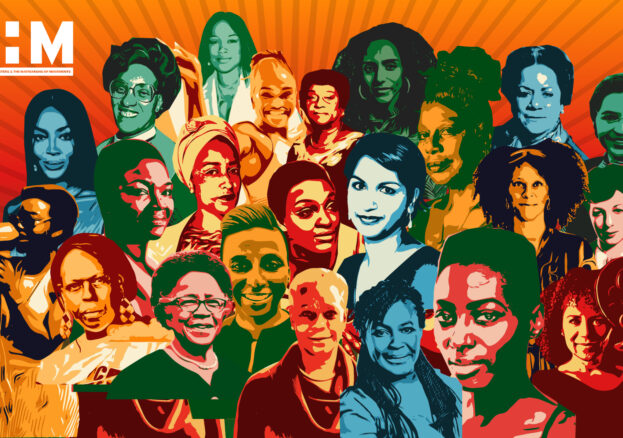For whom… and what are you going to do about it?
The moment the Euro tournament ended, I knew those three brave football players would become a ready-made, unfair target for cruel racial abuse.
The sad truth is that I wasn’t the only one who thought this.
Please note: this piece is based on my lived experiences, which might be hard to read. It may evoke tricky feelings for the reader and I would encourage those feelings to be aired respectfully in the comments section of the blog.
I want to start this account with some sincere and honest questions:
-
Have you ever been insulted while at work, explicitly because of the colour of your skin?
-
Have you been told that someone looking like you would not be hired for a care role, even if it was illegal to discriminate on that basis?
-
Have you worried about being turned down for a Personal Injury case because of your ethnicity?
-
Have you ever shared a query about a social inequality on social media, only to have someone tell you that it was wrong of you to raise such issues openly?
I have.
I’ll let that sink in for a moment…
Just in the time since I began working in Personal Injury, I have personally experienced the following:
- I have been called a ‘black bitch’ by a client’s family member.
- I have been told by colleagues, as explicitly as this: that if clients or their family members do not wish to have someone working for them who – regardless of skills and experience – speaks English with an accent or who is not white, it’s understandable.
- Every single time I am referred a case (in spite of my double doctorate and 20 years’ clinical experience), I wonder whether it’s really me that they will see, or just the colour of my skin.
- I have been shut down by an employee of a large Personal Injury-related organisation for curiously picking up on a topic involving potential racial bias that I felt could have been better expressed… only to be told privately that I must not criticise the organisation.
I have worked and run a company in the Personal Injury field as a Case Manager and a treating Psychologist for over a decade, but these experiences occurred in the last 2 years. In recent times. This is my living experience of being a brown Case Manager and Clinical Psychologist in the Personal Injury space.
How does that make you feel, knowing that this is my real-life experience in a field where you work too?
For those who have continued to read, thank you for staying with me. You may have noticed that the experiences I have shared exist on many levels: with individual clients, with their immediate families, at a professional level, and at organisational levels.
That’s every layer of my work existence.
So, I ask again, how does reading this make you feel?
I’ll tell you how it makes me feel, via my Top 10 emotions (not exhaustive by any stretch):
I feel alone.
I feel like I’m misunderstood.
I feel invisible.
I feel like I need to protect myself.
I feel that if I say something, my job is at risk. If I don’t say something, my soul is in pain.
I feel stuck.
I feel angry.
I feel that there’s nowhere to go with my many distressed feelings.
I feel threatened.
I feel unsafe.
I shouldn’t have to feel this way. But, I do.
And pretty much every minority Personal Injury professional I have spoken to will recognise and share some, if not all, of these experiences and feelings. But I know it’s not just me or those in my field. In fact, a simple Google search throws up the following disparities across all sorts of walks of life:
a. Education: https://www.manchester.ac.uk/discover/news/racism-is-still-a-huge-problem/
c. Workforce: https://www.tuc.org.uk/news/tuc-institutional-racism-exists-uk-labour-market-and-society
d. Politics: https://www.gov.uk/government/organisations/commission-on-race-and-ethnic-disparities (although we know that the UK’s Commission on Race and Ethnic Disparities report has been heavily condemned for its denial of structural racism, it does at least acknowledge that racism still exists)
Racism is its own psychological pandemic that has gone on for generations: fundamentally untreated, in the main. According to my and others’ experiences, it seems to exist in the Personal Injury field loudly, clearly and currently for those who experience and choose to see it.
Like many of you reading this far, I have dedicated my entire professional life to supporting, helping and caring for those less privileged and more vulnerable than myself. If any of my clients felt or expressed what I wrote about earlier in this piece, I would advocate using my moral compass for them. I’m sure you would do the same. Psychological safety is crucial in our work of already-present trauma, loss, grief, sadness and pain.
So, here’s the thing: Will you advocate using your moral compass for other less privileged, vulnerable minority colleagues, now that you know about our lack of safety and our pain?
Research says that a community approach to managing inequalities is a must. This lies at the core of the anti-racism movement, and it calls on you. Right now. If you believe what I am saying here, together we have the power to challenge, minimise, eliminate and ensure the banishment of dangerous biases, conscious or unconscious, racial and beyond.
I want, and deserve, to feel safe in my work. I am not asking for it to be to the detriment of my clients’ needs, but I don’t see it as an either/or situation. We should all be encouraged to feel safe and to feel that we are no threat to one another. Only then will the therapeutic alliance build to serve and sustain us all.
If you care to join me, here are my suggestions to hold a more community-spirited position about race (or any) imbalance that sadly also exists in the Personal Injury realm and our world at large:
1. Accept with your heart and mind that bias is a problem for all minority people, and it is painful for everyone.
2. Acknowledge that you are part of that problem if you choose to ignore the existence of racism. That is of course your choice, but the harsh reality is that if your consciousness is alerted to a problem and you do nothing about it, you perpetuate the problem.
3. If a client illegally or unlawfully requests a particular ‘look’ of care worker and says this cannot be challenged because of their injury, consider the impact of accepting such a request on the kind of practitioner you want to be; consider whether colluding is the right message to send to everyone in the network. Essentially, ask yourself, is this a decision you can be proud of?
4. If a colleague shares with you a story of racial prejudice or abuse, do not brush it aside. Encourage them to raise it appropriately with their seniors. If they meet barriers, help them follow it through. It may never be recognised, but your support in those moments will be vital.
5. Help our teams, companies, firms and professional bodies understand and run, knowing that diversity and inclusion is not a modular concept – it is not about being tokenistic or giving lip-service. It is in the core of the work we do.
6. Know that sitting with any discomfort that this topic stirs for you or your colleague is immensely powerful and appreciated. If you can greet the discomfort with an open mind and genuine curiosity, you cannot be criticised. If it is truly coming from a good place, I promise you that it will be felt and known by those who know what you are trying to do, and you will gain supporters. From all backgrounds. See some really brave examples of anti-racism on social media below.
One of my missions for myself is that I want to live a fair, truthful and peaceful life. I want that for everyone else, too, but in reality we cannot experience this existence without one another: for if you are hurting, so am I.
We have a Psychology of Case Management podcast episode coming out on this very topic – look out for it and listen to other episodes to help maximise outcomes: www.psychworks.org.uk/podcast
Some examples of anti-racism posts on social media:
 · https://www.facebook.com/DoubleDownNews/videos/266835104989680/
· https://www.facebook.com/DoubleDownNews/videos/266835104989680/
· https://www.instagram.com/novareidofficial
· The Antiracist bookclub: https://www.antiracistbookclub.co.uk/?fbclid=IwAR0rkvCRoClfh955e_4110C61ZdZQcnB_rlO9EpMu30jUZ_moOFsKio8UWQ
We also have free online resources via our Case Managers’ LinkedIn group and Personal Injury Professionals Facebook group to help you develop ideas to support your clients and be supported within your role.
Come and join us!




